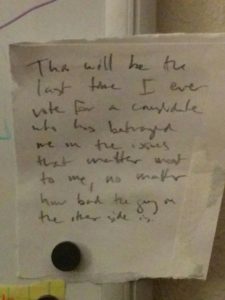I’m Not With Her. I am praying that she wins, but I’m not with her.
She’s the standard-bearer for the Democratic Party, anointed by the Democratic Party machine, the same machine that got handed a disaster substantially of Republican making back in 2008 and squandered the potential for real change in only two years.
Think back to 2008. Our economy was burning. An out-of-control financial sector had insisted throughout the late ’90s and early 2000s that what they needed was less and less regulation, and then predictably had brought the world economy to the brink of collapse. The government kept that collapse from happening by borrowing huge sums of money–from you and everyone you know and your children and your children’s children–to use to pay off the gambling debts of the richest institutions and people in the world. It was beyond vile. Maybe you remember.
Obama swept into power promising change. He brought on his coattails the first true both-houses-of-Congress Democratic majorities since 1994. I wept on Election Night 2008. These long years of horror are finally over, I thought.
Wrong.
In the face of the destruction wrought by the richest against the rest of us, what did Obama do with his ample political capital? Did he break up the Too Big to Fail banks? Did he reinstitute Glass-Steagall? Did he bring us sorely needed regulation of derivatives?
No. He put all his capital into health care.
Now, often when I bring up this point, people interrupt to tell me that Obamacare is better than what came before. I don’t deny it–though the latest bad news about huge premium increases seems to suggest that it might be more broken than its supporters want to admit–but that’s missing the point. The point is this: we have years and years and years of historical precedent telling us that the party in power tends to lose seats in the next mid-term elections, which meant that Obama and the Democrats had only two years of surefire political power to bring about the “change” we’d been promised. Furthermore, 2010 was a census year, which meant we’d have Congressional redistricting following the election. Given the prevalence of gerrymandering, the party that won the 2010 elections would have a substantial edge in the balance of power over the next 10 years.
As such, in the face of (a) an economy in shambles, caused by the greed and hubris of the megabanks (serving as proxies for the desires of the richest Americans); (b) understandably widespread anger at (a) and the concomitant loss of jobs, incomes, stability, etc. caused by this dangerously out-of-control greed; (c) the glaringly obvious, furious unpopularity of health-care reform, Obama’s choice to squander his and his party’s goodwill on Obamacare constituted as great a waste of political capital as we’ve ever seen in this country.
I propose that putting their energy into the obvious problem that had everyone mad might have kept the Democratic losses in the 2010 mid-terms manageable. Instead, the Democratic-led Congress gave us slap-on-the-wrist financial-sector reform and Obamacare. And instead of modest losses in the 2010 mid-terms, the Democratic Congress, hugely unpopular for pursuing a hugely unpopular policy, got absolutely crushed, sweeping Republican majorities into both houses of Congress, and giving Republican control to state legislatures around the country. Sure enough, the Republican Party used their electoral gains to do everything they could to consolidate their power, and they’ve used that control to hinder or outright block every serious policy initiative that Obama has brought forth during the last six years of his presidency.
And let’s additionally remember that during the first four years of Obama’s presidency, he chose to renege on his promise to close down Guantánamo, and ordered and had carried out the assassination of an American citizen in Yemen.
All of this is why I was so reluctant to vote for Obama in 2012, and why I felt the need to scrawl myself a reminder of how I felt that day for the years ahead.
The same strategic geniuses who brought us these policies threw all their weight behind Hillary Clinton, despite the loathing she inspired in huge swaths of the electorate. My note stayed on my whiteboard, where I saw it every day. But then the party with with the Machiavellian will to power got blindsided by the rabble-rousing populism they’d been laughingly fomenting for all these years and their once-vaunted discipline dissolved and we ended up with Trump. So I relinquished my resolve.
Despite everything, I’m praying that she wins.
